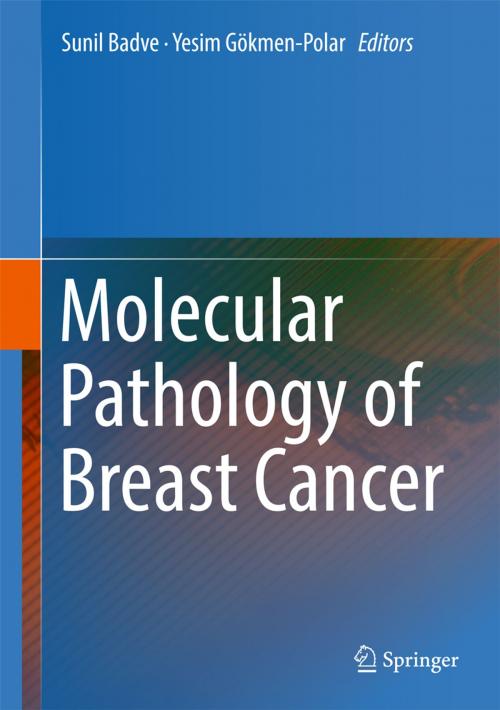Molecular Pathology of Breast Cancer
Nonfiction, Health & Well Being, Medical, Specialties, Oncology| Author: | ISBN: | 9783319417615 | |
| Publisher: | Springer International Publishing | Publication: | November 26, 2016 |
| Imprint: | Springer | Language: | English |
| Author: | |
| ISBN: | 9783319417615 |
| Publisher: | Springer International Publishing |
| Publication: | November 26, 2016 |
| Imprint: | Springer |
| Language: | English |
The complex landscape of breast cancer requires distinct strategies for the management of various molecular subtypes of this disease. Rapid advances in the field of molecular biology have been bewildering for those involved in its study and management. “Molecular Pathology of Breast Cancer” aims to close this knowledge gap by discussing comprehensively the evolution, biological basis and clinical applications with a focus on the “what, when, and how” of the most significant molecular markers known to date. These markers are evaluated in the context of genomic, transcriptomic and proteomic profiles, which is integral to the practice of precision medicine.
The application of next generation sequencing (NGS) has provided new insights in the regulation of genomic and transcriptomic structure and function. Alterations in DNA such as mutations and single nucleotide polymorphisms (SNPs) have been correlated with outcomes and provide for novel therapeutic approaches. These NGS analyses have also revealed the extensive contributions of epigenetic mechanisms such as histone modifications, non-coding RNA and alternative splicing. All of these changes together contribute to alterations in proteome. Newer assays that allow greater stability and analytical consistency are emerging. These alterations in tumor profiles can be also now detected by imaging techniques.
The heterogeneity of both tumor and tumor microenvironment, an inevitable reality, is discussed in detail with particular focus on cancer stem cells and immune signaling. A chapter is dedicated to the emerging technology of “liquid biopsy”, which opens a novel approach for “continuous” monitoring of cancer that might be superior to conventional diagnostics,
“Molecular Pathology of Breast Cancer” provides a quick and easy, not to mention essential, tour for clinicians, pathologists and scientists who are seeking to understand the integration of molecular biology into the diagnosis, prognosis and management of breast cancer.
The complex landscape of breast cancer requires distinct strategies for the management of various molecular subtypes of this disease. Rapid advances in the field of molecular biology have been bewildering for those involved in its study and management. “Molecular Pathology of Breast Cancer” aims to close this knowledge gap by discussing comprehensively the evolution, biological basis and clinical applications with a focus on the “what, when, and how” of the most significant molecular markers known to date. These markers are evaluated in the context of genomic, transcriptomic and proteomic profiles, which is integral to the practice of precision medicine.
The application of next generation sequencing (NGS) has provided new insights in the regulation of genomic and transcriptomic structure and function. Alterations in DNA such as mutations and single nucleotide polymorphisms (SNPs) have been correlated with outcomes and provide for novel therapeutic approaches. These NGS analyses have also revealed the extensive contributions of epigenetic mechanisms such as histone modifications, non-coding RNA and alternative splicing. All of these changes together contribute to alterations in proteome. Newer assays that allow greater stability and analytical consistency are emerging. These alterations in tumor profiles can be also now detected by imaging techniques.
The heterogeneity of both tumor and tumor microenvironment, an inevitable reality, is discussed in detail with particular focus on cancer stem cells and immune signaling. A chapter is dedicated to the emerging technology of “liquid biopsy”, which opens a novel approach for “continuous” monitoring of cancer that might be superior to conventional diagnostics,
“Molecular Pathology of Breast Cancer” provides a quick and easy, not to mention essential, tour for clinicians, pathologists and scientists who are seeking to understand the integration of molecular biology into the diagnosis, prognosis and management of breast cancer.















